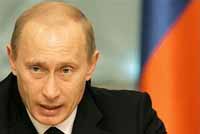Putin opens annual news conference with praise of country's economic surge
President Vladimir Putin began his annual marathon news conference Tuesday by praising Russia's economic growth, but added that the government has much to do to reduce inequalities in Russians' standards of living.

Putin said growth of 6.7-6.9 percent in the country's gross domestic product last year and increased spending on education and public health were signs of Russia's continued recovery from its economic troubles of less than a decade ago.
"But we still have to do very much in the social sphere," including "reducing the gap between highly paid groups of the population and the citizens of our country who still live very, very humbly," Putin said before taking the first of what was expected to be hours of questions from some 1,200 journalists.
The news conference, is televised live on two nationwide state-run channels
With the end of Putin's second term approaching and the March 2008 election drawing closer, one issue sure to be addressed was succession. The Constitution limits Russian presidents to two consecutive terms, and the nation has not had a normal transfer of power by popular vote in its post-Soviet history.
Putin was likely to be asked whether he will clearly support a particular protege as successor, and if so, who will it be. First Deputy Prime Minster Dmitry Medvedev and Defense Minister Sergei Ivanov appear to be front-runners for the Kremlin nod, but there are plenty of alternate theories about how Putin will end his time in office.
One theory suggests he will stay in power, despite his repeated statements to the contrary.
On foreign affairs, Putin is likely to speak about Kosovo; he has said a decision on the status of the breakaway Serbian province could send a signal to separatist regions in the former Soviet Union.
Questions about Iraq and Russia's cooperation with Iran also seemed sure to arise. Russia's relations with the West are a perennial topic at the news conference, which gives foreign journalists a rare chance to directly ask a question of Putin and gives Putin a chance to portray Russia, as he often does, as a country under attack from ill-wishers abroad, reports AP.
This time, Russia's reputation has been battered by the killings late last year of two critics, investigative journalist Anna Politkovskaya and former security agent Alexander Litvinenko, who blamed Putin for his radiation poisoning in a deathbed statement.
The Kemlin also has campaigned to limit foreign involvement in key economic sectors and deepened Western concerns about Russia's reliability as an energy supplier after a dispute with Belarus shut down a pipeline to Europe.
Subscribe to Pravda.Ru Telegram channel, Facebook, RSS!


